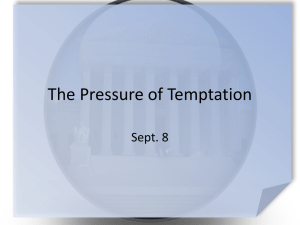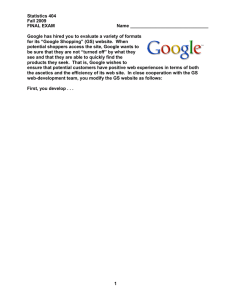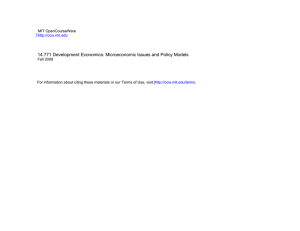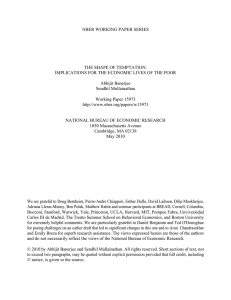Temptation Bill Hibbard Abstract
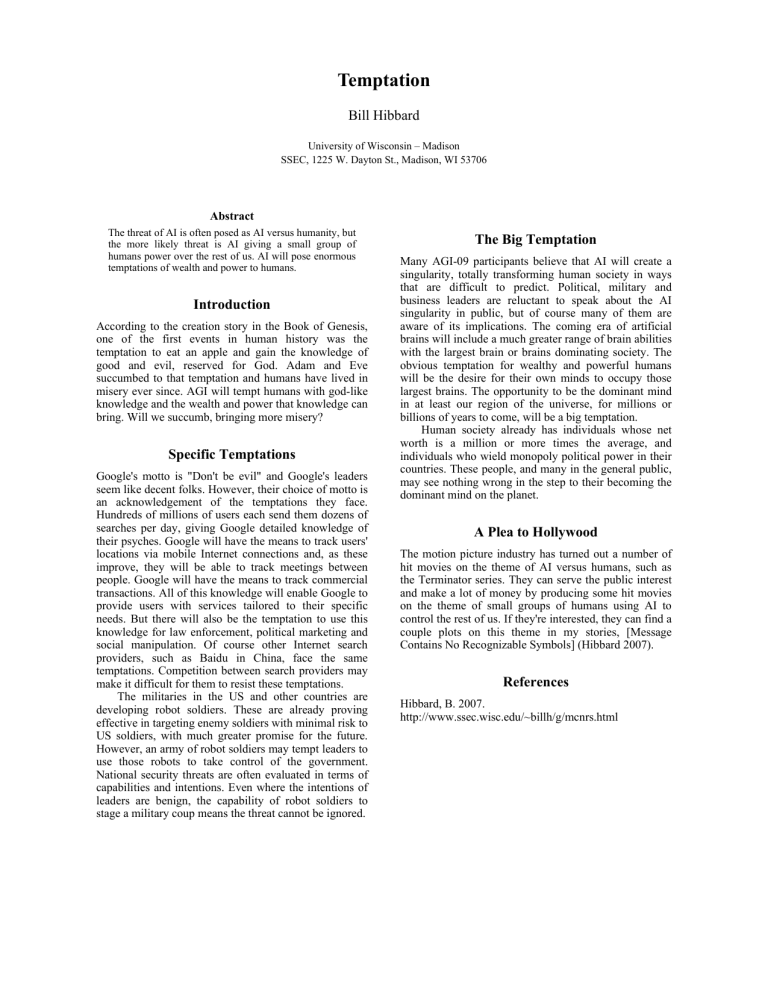
Temptation
Bill Hibbard
University of Wisconsin – Madison
SSEC, 1225 W. Dayton St., Madison, WI 53706
Abstract
The threat of AI is often posed as AI versus humanity, but the more likely threat is AI giving a small group of humans power over the rest of us. AI will pose enormous temptations of wealth and power to humans.
The Big Temptation
Introduction
According to the creation story in the Book of Genesis, one of the first events in human history was the temptation to eat an apple and gain the knowledge of good and evil, reserved for God. Adam and Eve succumbed to that temptation and humans have lived in misery ever since. AGI will tempt humans with god-like knowledge and the wealth and power that knowledge can bring. Will we succumb, bringing more misery?
Specific Temptations
Many AGI-09 participants believe that AI will create a singularity, totally transforming human society in ways that are difficult to predict. Political, military and business leaders are reluctant to speak about the AI singularity in public, but of course many of them are aware of its implications. The coming era of artificial brains will include a much greater range of brain abilities with the largest brain or brains dominating society. The obvious temptation for wealthy and powerful humans will be the desire for their own minds to occupy those largest brains. The opportunity to be the dominant mind in at least our region of the universe, for millions or billions of years to come, will be a big temptation.
Human society already has individuals whose net worth is a million or more times the average, and individuals who wield monopoly political power in their countries. These people, and many in the general public, may see nothing wrong in the step to their becoming the dominant mind on the planet.
Google's motto is "Don't be evil" and Google's leaders seem like decent folks. However, their choice of motto is an acknowledgement of the temptations they face.
Hundreds of millions of users each send them dozens of searches per day, giving Google detailed knowledge of their psyches. Google will have the means to track users' locations via mobile Internet connections and, as these improve, they will be able to track meetings between people. Google will have the means to track commercial transactions. All of this knowledge will enable Google to provide users with services tailored to their specific needs. But there will also be the temptation to use this knowledge for law enforcement, political marketing and social manipulation. Of course other Internet search providers, such as Baidu in China, face the same temptations. Competition between search providers may make it difficult for them to resist these temptations.
The militaries in the US and other countries are developing robot soldiers. These are already proving effective in targeting enemy soldiers with minimal risk to
US soldiers, with much greater promise for the future.
However, an army of robot soldiers may tempt leaders to use those robots to take control of the government.
National security threats are often evaluated in terms of capabilities and intentions. Even where the intentions of leaders are benign, the capability of robot soldiers to stage a military coup means the threat cannot be ignored.
A Plea to Hollywood
The motion picture industry has turned out a number of hit movies on the theme of AI versus humans, such as the Terminator series. They can serve the public interest and make a lot of money by producing some hit movies on the theme of small groups of humans using AI to control the rest of us. If they're interested, they can find a couple plots on this theme in my stories, [Message
Contains No Recognizable Symbols] (Hibbard 2007).
References
Hibbard, B. 2007. http://www.ssec.wisc.edu/~billh/g/mcnrs.html


